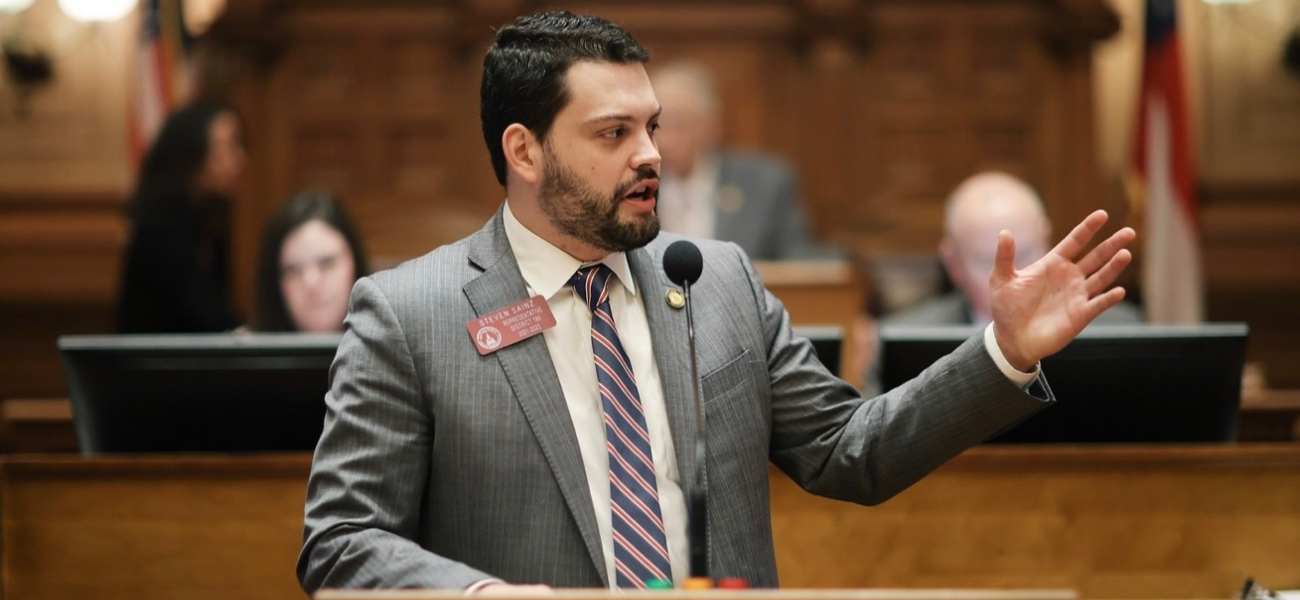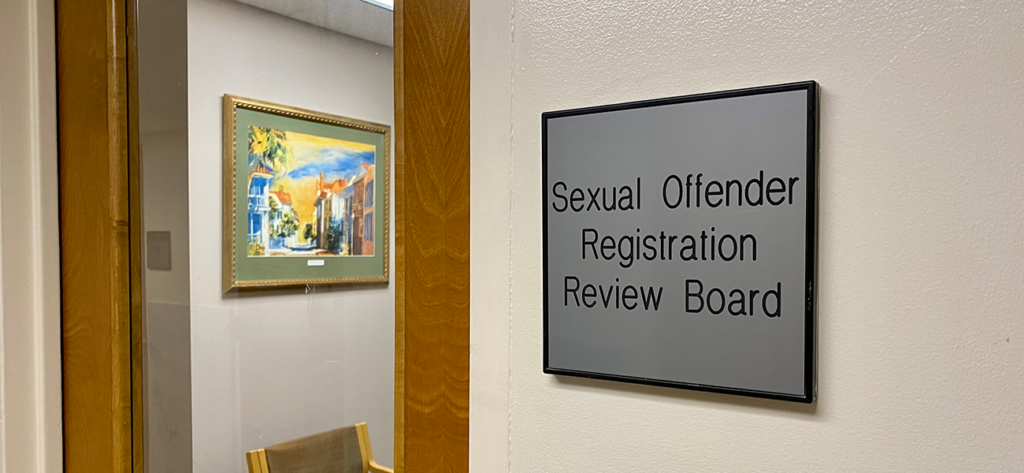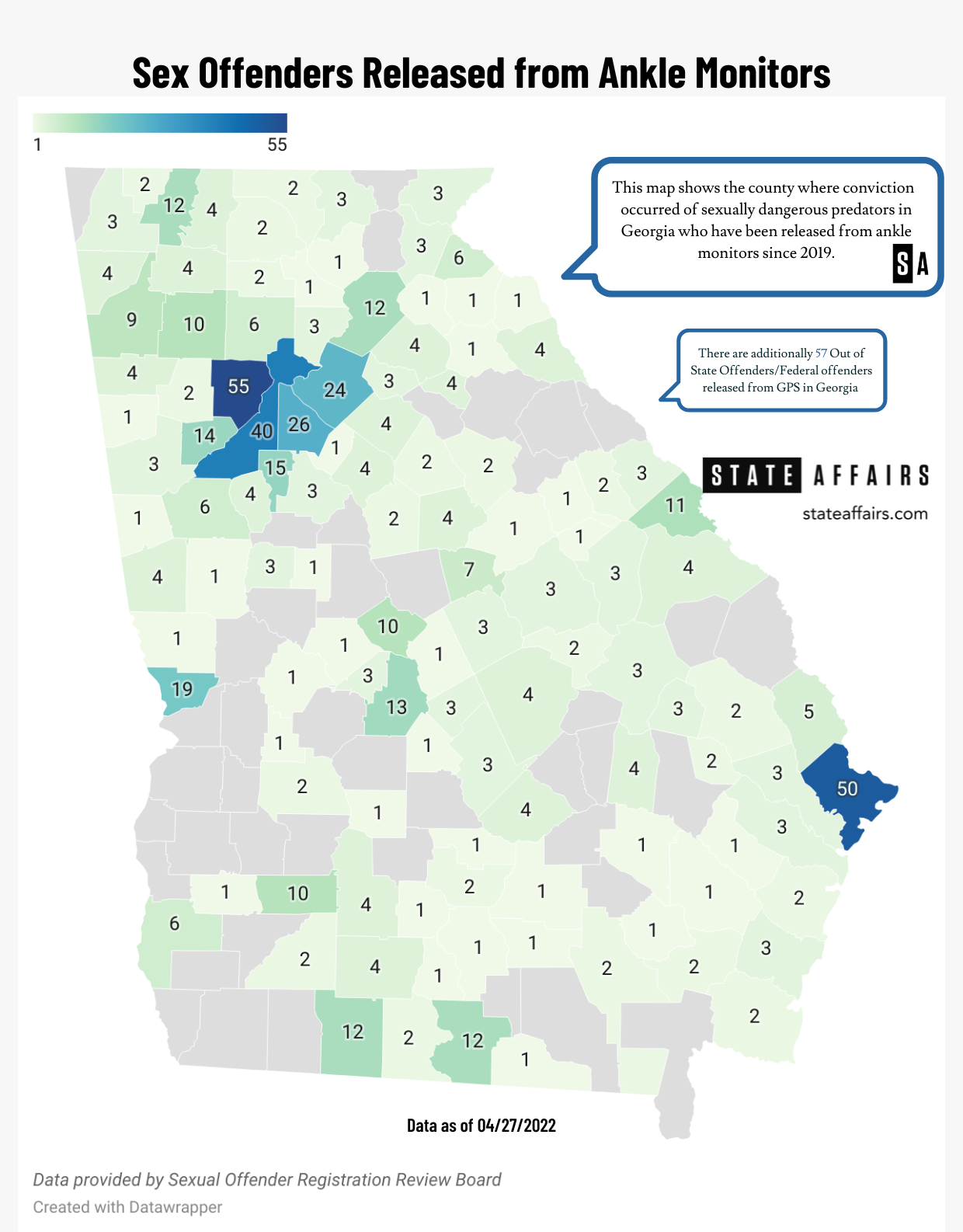Stay ahead of the curve as a political insider with deep policy analysis, daily briefings and policy-shaping tools.
Request a DemoGeorgia sex predator ankle monitor removals near 670 as legislation stalls

Credit: Georgia House of Representatives
- Nearly half of Georgia’s most dangerous sex predators have had their ankle monitors removed in recent years.
- State lawmakers still have not passed a legal fix recommended by the Georgia Supreme Court in 2019.
- The risks for sex predators to reoffend makes losing the ankle monitors a tough pill to swallow for many local sheriff’s offices and victim advocates.
Quietly over the last two-and-a-half years, Georgia has released hundreds of the state’s most dangerous sex predators from their ankle monitors despite court officials giving state lawmakers a roadmap in 2019 for how to fix the issue.
So far, nothing’s changed.
What’s Happening
Nearly 670 of Georgia’s riskiest sex predators have had their ankle monitors removed since 2019, when the Georgia Supreme Court ruled the state’s system for requiring lifetime GPS monitoring was unconstitutional.
That’s roughly half of Georgia’s so-called “sexually dangerous predators,” according to the state Sexual Offender Registration Review Board (SORRB).
These are offenders with multiple convictions for felony sex crimes – such as rape, child molestation and possessing child pornography – and who SORRB has found at risk for committing another crime once released from prison.
“We’re not talking about the one-offense people here,” said Tracy Alvord, SORRB’s executive director. “We’re talking about predators.”

All convicted sex offenders that SORRB classified as “sexually dangerous” automatically had to wear ankle monitors for the rest of their lives, before the state’s high court gutted SORRB’s ability to require lifetime GPS monitoring that would force many predators to keep wearing ankle bracelets after their sentences ended.
The court justices didn’t leave it at that. They nudged lawmakers to give local judges more power to impose lifetime monitoring as part of a predator’s sentence, instead of SORRB. A bill to do so emerged in the 2020 legislative session.
It passed the state House of Representatives but stalled in the state Senate that year. The same happened the next year. And it failed once more in this year’s session, which wrapped up earlier this month.
“I firmly believe that years down the road, there will be a sexual assault that we could have prevented but did not because we haven’t passed this legislation,” said state Rep. Steven Sainz (R-St. Marys), the bill’s sponsor. “We need to do something to stop that floodgate from continuing.”

The number of new sex-offender cases in Georgia slowed down during the COVID-19 pandemic, when courts shuttered for months statewide to fight the virus, Alvord said. There’s since been “a big pick up of cases,” she added – likely due to courts now working through backlogged cases.
The 2019 court ruling followed a previous decision from the court striking down a Georgia law that prohibited registered sex offenders from living within 1,000 feet of a playground, school, daycare or church. The court deemed that law unconstitutional in 2007.
Why It Matters
The more than 1,300 sexually dangerous predators in Georgia make up a small part of the state’s roughly 24,000 sex offenders, most of whom have convictions for less severe crimes, according to the Georgia Bureau of Investigation (GBI).
But it’s the nature of the acts committed by these predators and their risk to reoffend that makes losing the ankle monitors a tough pill to swallow for many local sheriff’s offices and victim advocates.
“It does make it more difficult to track that person if they’re a predator,” said Barrow County Sheriff Jud Smith. Since these persons have been convicted of such severe sex crimes, Smith said, “I think they need to be monitored a little closer.”
Take the case of Joseph Park, a DeKalb County resident and convicted sex offender deemed by SORRB as a “sexually dangerous predator” whose lawsuit against the state prompted the 2019 court ruling.

Park was convicted of child molestation for having sex with a 15-year-old when he was 50, which he claimed was consensual. SORRB records state he took pictures of underage girls and hosted parties at his house, where alcohol and drugs were offered to minors.
His criminal record includes multiple arrests between 1972 and 2011, plus convictions for child molestation, sexual exploitation of children, enticing a child for indecent purposes and illegal drug possession. He violated probation for failing to report after his prison release.
Gayla Nobles, the executive director of the Southern Crescent Sexual Assault and Child Advocacy Center in Clayton County, said she’s frustrated by the lack of action from state lawmakers to address ankle monitors.
“If there’s something we can do to protect the community, and if we’re talking about the most dangerous sex offenders, this just seems to be a no-brainer for me,” Nobles said. “It’s an easy answer to add that actual layer of protection.”
Debate over legal fix
After three years of legislative wrangling, Sainz and critics of his bill still haven’t gotten on the same page about how to patch up the legal hole caused by the 2019 ruling.
Much of the disagreement stems from whether the bill is even needed, since state law already carries lifetime prison or probation punishments with ankle monitors for some serious crimes such as felony rape, aggravated sodomy, child molestation and kidnapping a victim under 14-years old. Sex offenders must register annually in a publicly searchable database.

Critics have also noted Sainz’s bill would slap lifetime monitoring on a person convicted twice of statutory rape, which is defined as consentual sex with anyone under the age of 16. That could saddle people who are not dangerous predators with a punishment that doesn’t fit the crime, said Jill Travis, executive director of the Georgia Association of Criminal Defense Lawyers.
“It’s a solution in search of a problem,” Travis said of Sainz’s bill. “People can change, especially when they’ve been through the system and don’t want to go back.”
Smith, the sheriff in Barrow County, agreed the lifetime GPS monitoring should apply for the worst sex offenders. His office now removes monitors when ordered by a judge to do so.
“At the end of the day, we certainly don’t want to overstep our boundaries and violate their rights,” Smith said. “There is a delicate balance on what we can and can’t do.”

What’s Next?
Despite three years of stumbles, Sainz says he’s not ready to throw in the towel with his bill.
His motivation traces to when he was 18 years old and went through the Kingsland Police Department’s training academy in Camden County. While there, he met investigators who worked local sex cases, particularly involving internet child pornography.
The experience left an impression.

“This is some of the hardest police work in the state,” Sainz said. “It’s easy not to want to focus on it, but it is the most impactful for victims.”
Travis also acknowledged some strides have been made on a compromise bill, particularly by tweaking it to give judges more discretion over sentencing offenders to lifetime monitors rather than requiring it for certain crimes.
But she’s still not convinced Sainz’s bill should ever reach the finish line.
“The tools are (already) there,” Travis said. “It’s just a matter of using them.”
Meanwhile, Alvord at SORRB expects more sexually dangerous predators to lose their ankle monitors over the next year until the 2023 legislative session starts. She’s keen for supporters and critics of Sainz’s bill to hammer out a solution – sooner rather than later.
“I do understand people’s concern and appreciate their caution,” Alvord said. “But I’m very disappointed.”
Join the Conversation
What else do you want to know about criminal justice and state government in Georgia? Share your thoughts/tips by emailing [email protected].
Want to contact your local state legislator about this issue? Find your legislator here.
Professionals still face licensing delays amid state’s transition to online system
The Gist Georgia’s professionals and business owners are still struggling to obtain professional licenses in a timely manner. As the Secretary of State’s Office rolls out its new Georgia Online Application Licensing System to expedite the process, the efficiency of this new process is being put to the test. What’s Happening Thursday morning at the …
Controversy over AP African American Studies class grows
Rashad Brown has been teaching Advanced Placement African American Studies at Atlanta’s Maynard Jackson High School for three years. He’ll continue to do so — even though the state’s top education official removed it from the list of state-funded course offerings for the upcoming school year. While Brown prepares to start teaching his class on …
Students, teachers, lawmakers blast decision to end AP African American history classes
ATLANTA — A coalition of lawmakers, civil rights leaders, clergy, educators and students Wednesday called on the state’s education czar to rescind his decision to drop an advanced placement African American studies class from the state’s curriculum for the upcoming school year. “This decision is the latest attack in a long-running GOP assault on Georgia’s …
Kamala Harris’ presidential bid reinvigorates Georgia Democrats
Georgia Democrats have gained new momentum heading into the November election, propelled by President Joe Biden’s decision to bow out of his reelection bid and hand the reins to Vice President Kamala Harris. The historic decision, announced Sunday, is expected to prove pivotal in the national and state political arenas and breathe new life and …




